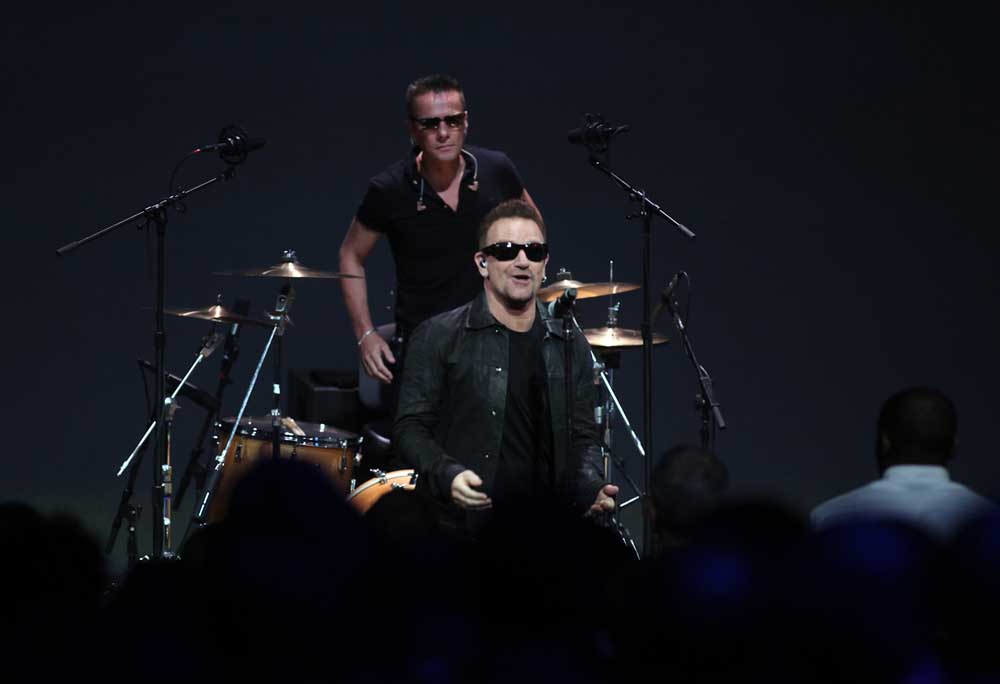How Bono became Silicon Valley’s rock star
Published 12:00 am Sunday, May 24, 2015

- Karl Mondon / Bay Area News GroupBono acknowledges the applause after U2 performed one song at an Apple product release event at the Flint Center in Cupertino, California.
SAN JOSE, Calif. — Everybody knows that Bono — the legendary leader of the multiplatinum rock band U2 — hails from Ireland.
Yet, his ties to Silicon Valley are almost as thick as his Dublin brogue.
So when the 55-year-old singer born Paul David Hewson brought his band to San Jose’s SAP Center for concerts Monday and Tuesday, he returned to an area with which his connections — both financial and emotional — run deeper than many people realize.
The relationship was underscored earlier this month when he performed “One,” a cherished U2 hit, at Stanford University for the memorial for Dave Goldberg, the SurveyMonkey CEO and husband of Facebook COO Sheryl Sandberg. There’s also the band’s long-running financial relationship with Apple, which was most recently demonstrated by performing at Apple’s iPhone 6 launch in September — and the controversial downloading of U2’s album “Songs of Innocence” free to iTunes subscribers without permission.
But the roots of Bono’s alliance with Silicon Valley actually date back to before the turn of the 21st century, when he came to the tech world’s capital looking for help with two of his greatest passions — his burgeoning charity work and U2’s uncertain future.
Following the disappointing public reaction to the album “Pop,” Bono quipped that U2 was “reapplying for the job of best band in the world.” He was determined to ensure the band’s future artistically and commercially in a landscape in which music-buying was changing fast.
“In the late ’90s, Bono told me that he perceived that the future of music and the future of Africa were totally dependent on what was going in Silicon Valley,” said venture capitalist Roger McNamee, who has since become a business partner with Bono.
Noting that technology held the keys to delivering music and as well as spreading his message of helping the disadvantaged, Bono sought out allies in the valley. McNamee had gained a reputation as a savvy digital marketer by helping the surviving members of the Grateful Dead sell their music online, so Bono got in touch.
In 2004, Bono, McNamee and three others founded the venture capital firm Elevation Partners. It was around this time that Bono and his bandmates, struck by the potential of portable iPod players and the iTunes store, forged a relationship with Apple and its leader, Steve Jobs.
“So we had the idea to offer (the U2 song) ‘Vertigo’ for an iPod commercial, and we went out to see Steve at his house in Palo Alto,” Bono recalled in a recent interview with Rolling Stone magazine. “And he was like, ‘What? You guys want to give me a song for a commercial? Wow, that’s great, that’s amazing.’ Then we said we wanted to be in the commercial, and he said, ‘Maybe, yeah, I don’t see why not.’”
For U2, which had never allowed its music to be used in advertisements, it was a huge shift.
Bono and Jobs became such good friends they reportedly vacationed together. Apple and Jobs’ wife, Laurene, were big supporters of Bono’s global AIDS fight. Bono told Rolling Stone he was drawn to Jobs’ fierce intellect as well as his “very tender” side and that the Apple founder, ironically, often expressed concern about Bono’s health. When Jobs died of cancer in 2011, Bono, along with Joan Baez and Yo-Yo Ma, performed at his memorial.
“(Jobs) is, in many ways, the Bob Dylan of machines — he’s the Elvis of the kind of hardware-software dialectic,” Bono told Rolling Stone. “He changed music, he changed film, he changed the personal computer. It’s a wonderful encouragement to people who want to think differently. That’s where artists connect with him.”
Bono, who was not available to interview for this story, arguably has an even bigger connection with McNamee and Elevation Partners, which is known for its investments in Facebook, Yelp, Palm (an Apple rival) and Move Inc.
McNamee said the rocker has “amazing marketing instincts” and brings his intense “seven-day-a-week” drive and considerable motivational skills to the table.
“Bono has always really annoyed people by talking about all this ‘do the right thing’ stuff — he’s totally in your face about it,” said KFOX radio DJ “Big” Rick Stuart. “The thing that is different about Bono, compared to a lot of other people, is he actually tries to back it up.
“Bono is kind of a self-righteous guy,” he adds, “but he’s also a righteous guy.”







